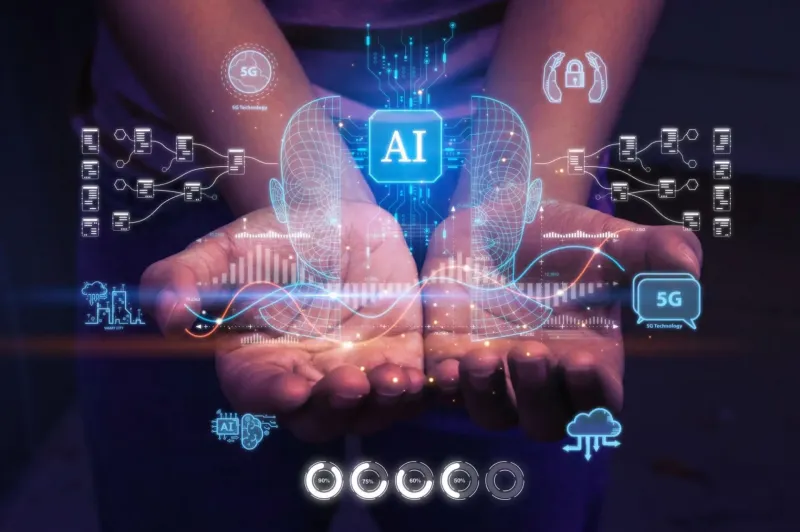
Introduction: Understanding the Basics of Artificial Intelligence
Artificial intelligence, commonly referred to as AI, is a branch of computer science that focuses on creating intelligent machines capable of performing tasks that typically require human intelligence. AI technology encompasses various techniques and algorithms designed to mimic cognitive functions such as learning, problem-solving, and decision-making. AI has a wide range of applications across different industries and sectors. Some common examples include natural language processing (NLP) for voice recognition and virtual assistants, computer vision for image recognition and object detection, robotics for automated manufacturing processes, and predictive analytics for forecasting trends and making data-driven decisions. Machine learning is a subset of AI that enables computers to learn from data without being explicitly programmed. It uses statistical techniques to analyze large volumes of information and identify patterns or make predictions based on the observed data. Machine learning algorithms play a key role in powering many AI applications by allowing systems to improve their performance over time through experience.
The Role of Artificial Intelligence in Healthcare
AI technology is making significant strides in the healthcare industry. One notable application is in medical diagnosis, where AI algorithms are being used to analyze patient data and assist doctors in making accurate diagnoses. Additionally, AI-powered imaging systems are enhancing the capabilities of medical imaging, enabling more efficient and precise analysis of scans and images. Another area where AI is making a positive impact is in telemedicine, where virtual consultations and remote monitoring can provide accessible healthcare services to patients from the comfort of their own homes.
Read more >> Unlock the World of Podcasts with Apple Podcasts
Artificial Intelligence in the Finance Industry: Revolutionizing Banking and Financial Services
Artificial Intelligence (AI) is making significant advancements in the field of finance. From chatbots that provide customer support to fraud detection algorithms, AI is revolutionizing how financial services are delivered. Additionally, robo-advisors are utilizing AI technology to provide automated investment advice and portfolio management services. These applications of AI in the finance industry are streamlining processes, enhancing customer experiences, and improving overall efficiency.
The Transformation of Transportation and Logistics through Artificial Intelligence
Artificial Intelligence (AI) is making significant strides in the transportation industry, particularly in the development and implementation of autonomous vehicles. These self-driving cars and trucks have the potential to revolutionize transportation by increasing safety, efficiency, and reducing congestion on our roads. Moreover, AI-powered predictive analytics is being used for logistics optimization, enabling companies to better plan and manage their supply chain operations. By analyzing vast amounts of data in real-time, AI algorithms can identify patterns and make accurate predictions regarding demand forecasting, inventory management, route planning, and vehicle maintenance. Overall, the integration of AI in the transportation industry is promising to enhance both safety and efficiency while driving innovative solutions for logistics optimization.
Artificial Intelligence in Education: Enhancing Learning Experiences and Personalized Education
AI has made its way into the education sector with the development of intelligent tutoring systems and adaptive learning platforms. These technologies are designed to enhance the learning experience for students by providing personalized and tailored support. Intelligent tutoring systems use AI algorithms to deliver individualized instruction, while adaptive learning platforms adapt the content and pace of learning based on student performance. With AI in education, students can receive targeted assistance and achieve better academic outcomes.
The Impact of Artificial Intelligence on Retail and E-commerce Industry
AI technology is revolutionizing various aspects of business operations. Personalized recommendations powered by AI algorithms help businesses enhance customer experiences by providing tailored suggestions based on individual preferences. Chatbots equipped with AI capabilities are being used for customer service automation, ensuring prompt and efficient assistance round the clock. Additionally, inventory management can benefit from AI algorithms that analyze data to optimize stock levels, reducing costs and improving overall efficiency.
Ethical Considerations and Challenges Surrounding Artificial Intelligence Development
As AI technologies continue to advance, data privacy concerns have become more prominent. It is essential to ensure that AI algorithms are used ethically and responsibly, taking into account the potential societal impact. Additionally, there are ongoing discussions about the future implications of artificial general intelligence (AGI) and how it may shape various aspects of our lives. Balancing innovation with ethical considerations will be crucial in harnessing the full potential of AI while safeguarding individual privacy and social well-being.








Showing 0 verified guest comments